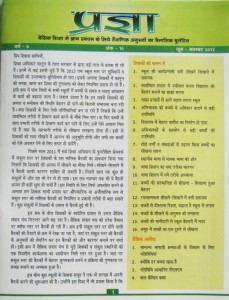Promoting Teachers as Learning Community for enhancing their Capacity & Motivation
To address the problem of low capacity of teachers, poor quality of their training and lack of academic support, this idea of involving teachers in educational change emerged. Despite in-service training, teachers prefer to follow their own set pattern, mostly promoting learning by rote, taking up lessons from text books, without any regard to students’ comprehension and learning need. Official trainings don’t facilitate Teachers’ own Construction of Knowledge, on the basis of reflecting on experiences, analysing experiences and drawing conclusions. On the contrary, many faulty ideas gets promoted (like children from poor economic background being of low IQ). When teachers do informally interact among themselves, talk ends up in chitchat, rather than on focussed exploration of subject, or systematic reflection on collective experiences.
RTE Act requires teacher to promote learning of children without fear and coercion. The Act expects teachers to cover the curriculum (& syllabus). The teacher find it conflicting. Most teachers believe that children will study when they are given fear of examination and pass-fail. RTE has provision for Continuous and Comprehensive Evaluation so that teachers are able to understand what children are learning and their learning needs. Thus Child centric teaching has been visualised, building on children’s natural curiosity and previous learning.
- Teachers Learning Forum is being promoted as voluntary initiative of teachers in which they periodically assemble on holiday to share their teaching practices and learn from each other. Along with it they also expose themselves to progressive theories in education. In this way not only good practices get shared, peer reviewed, but also a culture of participatory learning gets promoted (contrary to top driven & non-participatory training).
- This practice is expected to make teachers proactive for their own learning and improvement of school. This will further convey a message to education department and academic support system that teachers needs to be provided participatory learning spaces and some autonomy. Top down bureaucratic supervision is not the solution for teachers’ accountability and performance.
- This practice along with that of SMC & Parent Association will build a different institutional system where there is local accountability as well as some autonomy for teachers. Thus prospect of decentralized system of democratic governance of schools will grow.
- Practice of Teachers’ Forum evolved around 2007 in one Block and now it is getting spread to about 10 other Blocks of four districts, reaching out to about 600 teachers. Average attendance of teachers in a block level meeting is about 20.
- Lokmitra also did Policy Advocacy for promoting the idea of Peer Learning among teachers. (through workshop of knowledge Commission and through its regular advocacy effort). Now Peer Review at Cluster level has become part of New Framework of SSA (An Education Mission of MHRD).
- Lokmitra tries to find spaces in departmental trainings and at CRC level Peer Review sessions to promote participatory learning and bring some clarity in some basic concepts, like Constructivism Approach to Learning (knowledge creation).
- Lokmitra believes that if grassroots experiences of teachers are made the basis of teacher’s learning then many such paths will open that will be very effective in improving the dignity of teachers, enhancement of quality of education and better management of schools. Giving space and importance to teachers’ own experiences increases their morale. Sharing of such experiences in the company of each other leads to new learning and capacity building. Some experiences gets documented and published as a Bulletin (PRAGYA) for wider dissemination.
- During meetings excerpts from book of some educationist are read and discussed to promote learning from educational thought and practices in other part of the country. This promotess development of common understanding on conceptual aspect of education.
- Autonomy and participatory learning is important for their success in their profession. These teachers now believe that they should take initiative, rather than wait for direction from top. Even leaders of Teachers Union are appreciating this effort, even though they have mainly focused themselves on service condition.
- Teachers Forum is expected to put pressure on academic support system for participatory and demand driven training.
- Teachers’ Forum promoted in five blocks has now getting spread to 10 other Blocks of Raebareli. Teachers participating in Forums activity are developing sensitivity towards excluded children. Average attendance of teachers in a block level meeting is about 20. Teachers are coming forward in organizing the meeting of TF and in editing Bulletins.
Participatory Action research with functionaries of DIET-BRC-CRC
Lokmitra engages with DIET of Raebareli to link its own learning with that of DIET (for wider mainstreaming of innovation of Lokmitra), to promote DIETs’ institutional development & accountability and in the process gain an understanding of its functioning to further guide Lokmitra plan of future intervention.
Regular dialogue (individually and collectively) have been initiated with functionaries of DIET-BRC-CRC so as to promote their reflection on their practices and promote participatory learning. Subsequently DIET will be encouraged to organise a participatory self assessment of its work for internal use (possibly for sharing as well, especially Good Practices of DIET). Accordingly area of collaboration will be explored.

